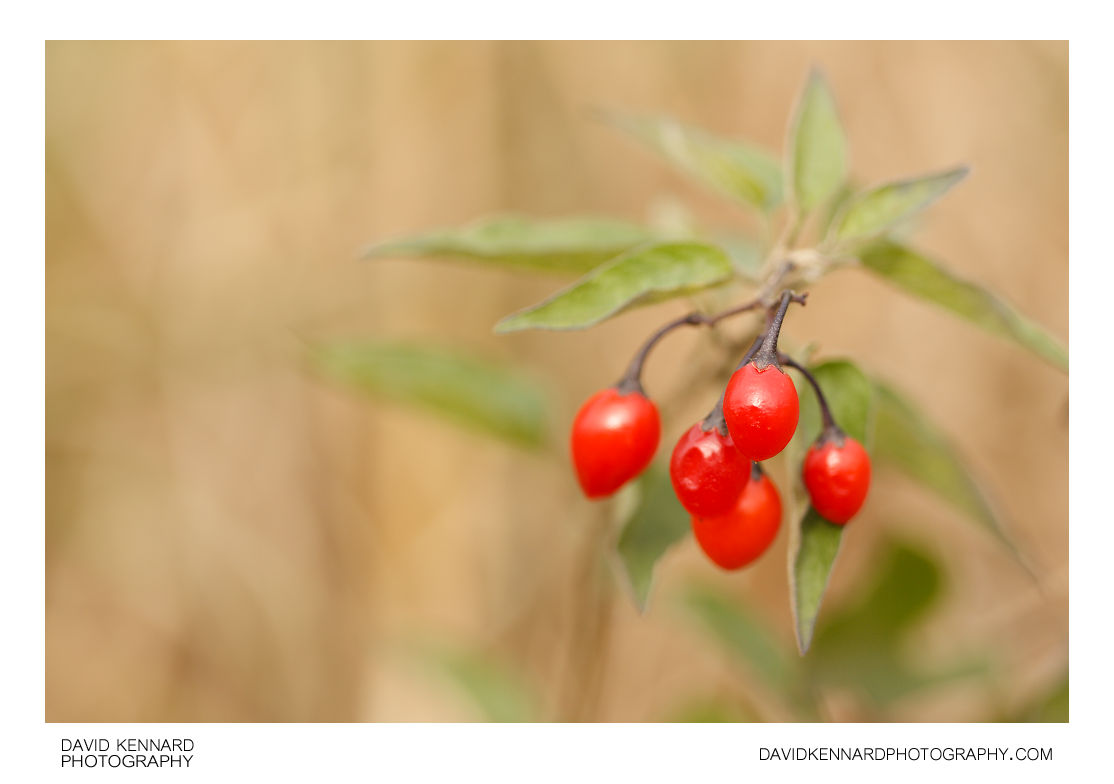Woody nightshade (Solanum dulcamara) berries

Description
- Title:
- Woody nightshade (Solanum dulcamara) berries
- Caption / Description:
-
Solanum dulcamara, also known as bittersweet, bittersweet nightshade, bitter nightshade, blue bindweed, Amara Dulcis, climbing nightshade, fellenwort, felonwood, poisonberry, poisonflower, scarlet berry, snakeberry, trailing bittersweet, trailing nightshade, violet bloom, or woody nightshade, is a species of vine in the potato genus Solanum, family Solanaceae.
It is native to Europe and Asia, and widely naturalised elsewhere, including North America, where it is an invasive problem weed. It occurs in a very wide range of habitats, from woodlands to scrubland, hedges and marshes. It is an invasive species in the Great Lakes region and was first spotted in 1843.
Bittersweet is a semi-woody herbaceous perennial vine, which scrambles over other plants, capable of reaching a height of 4 m where suitable support is available, but more often 1–2 meters high. The leaves are 4–12 cm long, roughly arrowhead-shaped, and often lobed at the base.
The flowers are in loose clusters of 3–20, 1–1.5 cm across, star-shaped, with five purple petals and yellow stamens and style pointing forward. The fruit is an ovoid red berry about 1 cm long, soft and juicy, and edible for birds, which disperse the seeds widely.
Description adapted from Wikipedia: http://en.wikipedia.org/wiki/Woody_nightshade
- Tags / Keywords:
-
- Biota
- Life
- Vitae
- Eukaryota
- Plantae
- Plants
- Magnoliophyta
- Flowering Plants
- Angiosperms
- Magnoliopsida
- Dicotyledons
- Solanales
- Solanaceae
- Nightshades
- Solanum
- Solanum dulcamara
- Woody nightshade
- Bittersweet
- Bittersweet nightshade
- Bitter nightshade
- Blue bindweed
- Amara Dulcis
- Climbing nightshade
- Fellenwort
- Felonwood
- Poisonberry
- Poisonflower
- Scarlet berry
- Snakeberry
- Trailing bittersweet
- Trailing nightshade
- Violet bloom
- Berries
Admin
- Date Original Photo Taken:
- Original File Name:
- _MG_8901.CR2
- Event:
- Rating:
- ☆
- Date this image added/last updated on website:
- Original File Dimensions:
- 4272px x 2848px
- File Type:
- JPEG
- Color Mode:
- Original Image Color Profile:
- Adobe RGB (1998)
Location
- Location Created:
-
- Sublocation:
- City:
- Marston Trussell
- Province/State:
- Northamptonshire
- Country:
- United Kingdom
- World Region:
- Europe
- Geo-location:
- 52.474981666667, -0.95096833333333 View on map
Rights
- Copyright Status:
- Copyrighted
- Licensing Status:
- Rights Managed
- Available for Editorial Use:
- Yes
- Available for Commercial Use:
- Yes
- Copyright Notice:
- © 2011 Dave Kennard
Camera Data
- Date Digital Resource was created:
- Shutter speed:
- 1⁄160 s
- Aperture:
- f/3.5
- Camera Model:
- Canon EOS 450D
- ISO:
- 100
- Exposure Compensation:
- 0
- Focal Length:
- 100mm
- Focal Length (35mm equiv.):
- Metering Mode:
- Multi-segment
- Flash:
- Off, Did not fire
- Exposure Mode:
- Manual
- White Balance:
- Manual
- Light Source:
- Exposure Program:
- Manual
Additional shooting metadata
- Lens:
- Canon EF 100mm F2.8 Macro USM
- Filters used:
- Additional Optics used:
- Setup:
- Handheld
Liveview with Perfect LCD Viewfinder
Post Processing
- Image Modified:
- Software used:
-
- Adobe Camera RAW
- Post Processing:
